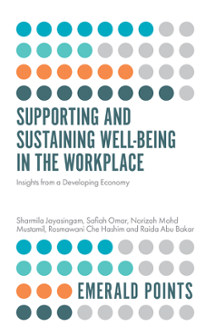
Index
Supporting and Sustaining Well-Being in the Workplace: Insights from a Developing Economy
ISBN: 978-1-83982-695-5, eISBN: 978-1-83982-692-4
Publication date: 16 September 2020
Citation
Jayasingam, S., Omar, S., Mustamil, N.M., Hashim, R.C. and Bakar, R.A. (2020), "Index", Supporting and Sustaining Well-Being in the Workplace: Insights from a Developing Economy, Emerald Publishing Limited, Leeds, pp. 213-219. https://doi.org/10.1108/978-1-83982-692-420201009
Publisher
:Emerald Publishing Limited
Copyright © 2020 Emerald Publishing Limited